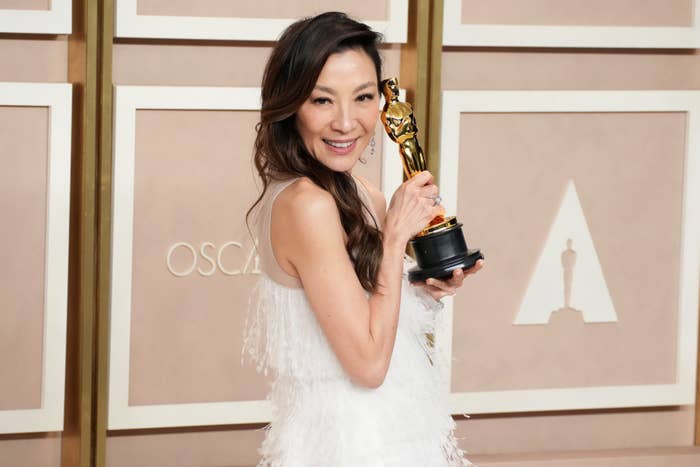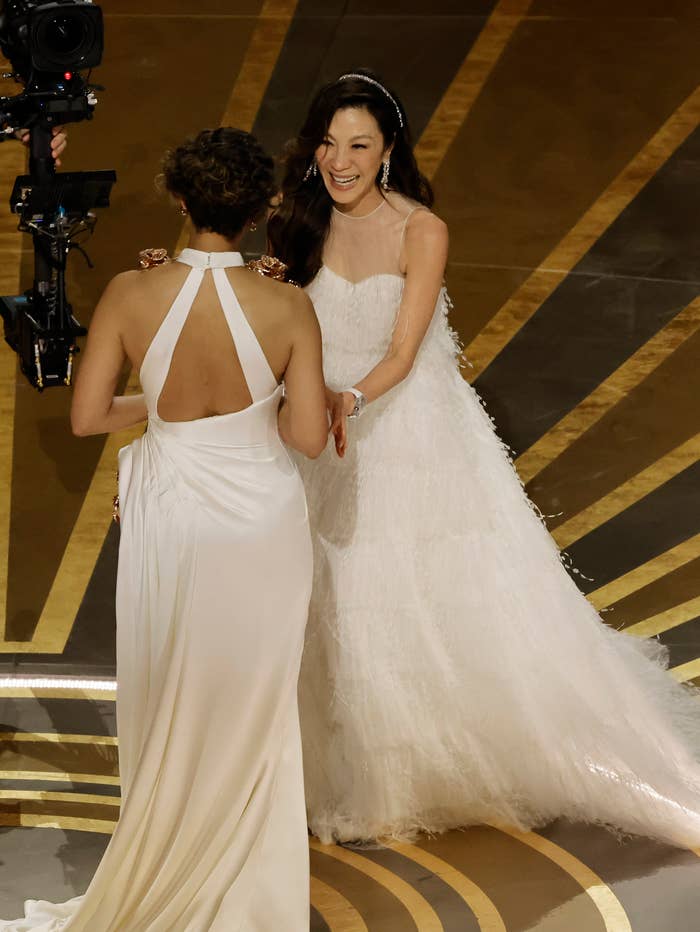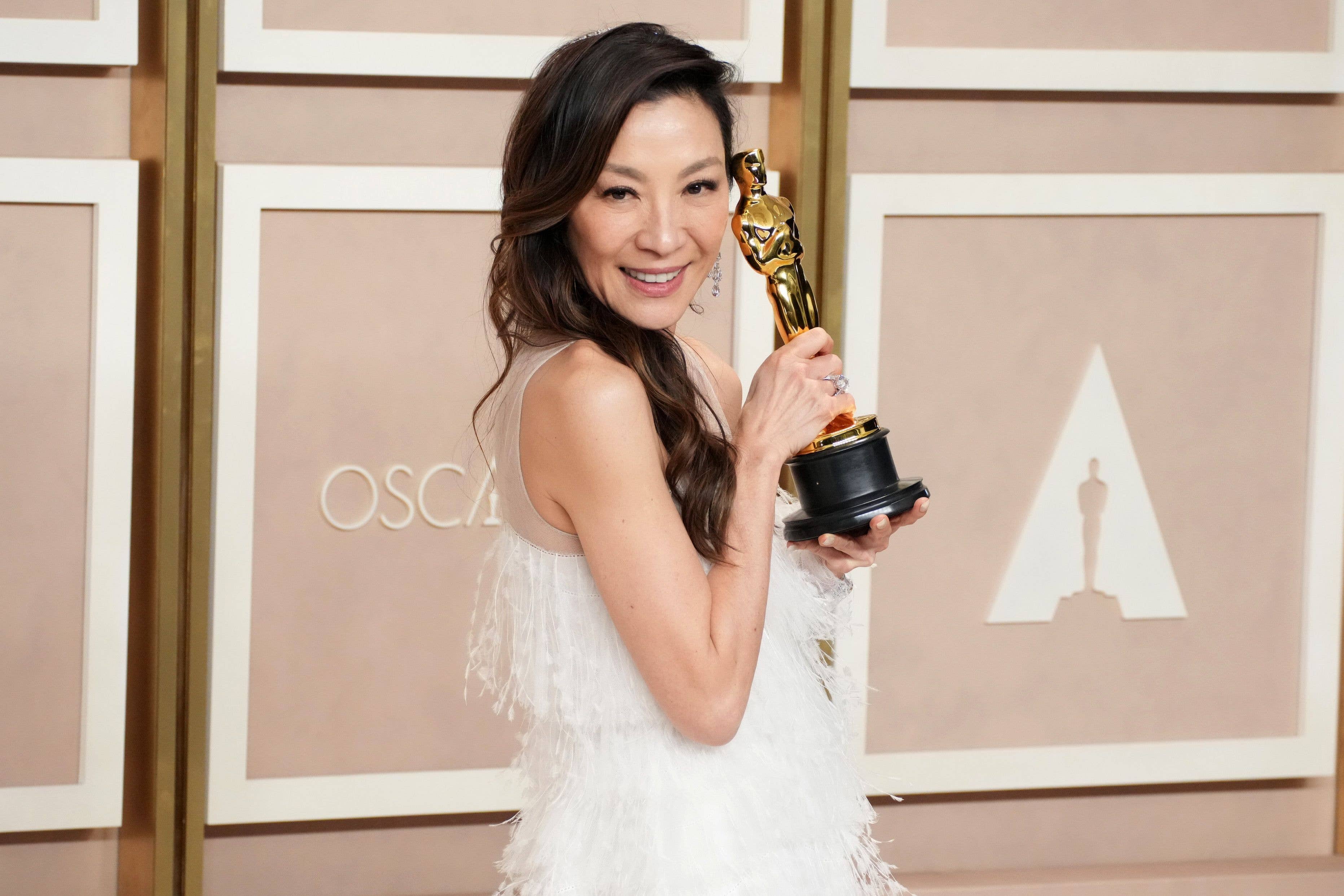
Michelle Yeoh won the Best Actress Oscar for her role in Everything Everywhere All at Once at the 95th Academy Awards. She is the second person of color to win the award, and the first person of Asian descent. Clearly emotional and with tears in her eyes, Yeoh was radiant as she gave her acceptance speech Sunday night.
“For all the little girls and boys who look like me watching tonight, this is a beacon of hope and possibility,” said Yeoh to the audience. “This is proof to dream big, and dreams do come true.”
Yeoh first made her name in Hong Kong action films, starring alongside Jackie Chan in Police Story 3: Supercop and in Yuen Woo-Ping’s Tai Chi Master and Wing Chun. She gained increased mainstream prominence with her role as a Bond girl in Tomorrow Never Dies. And she garnered critical acclaim for her lead role in Ang Lee’s Crouching Tiger, Hidden Dragon.
The Malaysian actor experienced a late-career renaissance beginning in 2018, receiving praise for her performances in Crazy Rich Asians and Shang-Chi and the Legend of the Ten Rings. Next, she will appear in two upcoming Avatar films, and she will reunite with Everything Everywhere All at Once co-star Ke Huy Quan in an adaptation of Gene Luen Yang’s graphic novel American Born Chinese.
Halle Berry, who for her role in 2002’s Monster’s Ball became the only other woman of color to win the award, presented the prize to Yeoh, which added symbolic significance. Their onstage meeting was a celebratory moment, but perhaps unintentionally, it was also a statement on unfulfilled promise.

When Berry won Best Actress over two decades ago, she referred to her win in bold, historical terms: “It’s for every nameless, faceless woman of color that now has a chance because this door tonight has been opened.” But in an interview with Teen Vogue in 2017, Berry expressed frustration with the 87th Academy Awards nominations in 2015, when all 20 acting nominees were white. What progress had actually been made?
It’s also important to remember how Berry’s win fit into the larger cultural dialogue surrounding the 2002 Academy Awards. In addition to Berry’s historic first, Whoopi Goldberg hosted the ceremony. Denzel Washington won Best Actor for his role in Training Day. Sidney Poitier received an honorary Oscar for his entire body of work. And these prominent wins, all lining up in the same year, led to accusations of pandering—that this was a singular, token attempt at “apologizing” for underrepresentation, after which things could return to the status quo.
There are parallels to this scenario at this year’s Academy Awards because Yeoh was not the only Asian person to win. Daniel Kwan won Oscars both for co-directing and for co-writing the film with Daniel Scheinert. Quan won for his supporting actor role. And Everything Everywhere All At Once won Best Picture. All told, the film won seven out of its 11 nominations.
It’s an impressive feat, especially because of the type of story that it is. Everything Everywhere All At Once is a comedy, which already puts it at a disadvantage against more serious fare. And it is an immigrant story that dares to be weird and subversive—to tell a highly specific story about generational trauma rather than catering to the mainstream. It is a film by us, for us. And Yeoh tells the story of many of our parents—sacrificing their dreams and potential to give their children something better. But then comes the tragedy of not knowing them fully, of being unable to connect with them, because somewhere along the way, they also sacrificed their relationships in pursuit of success.
As both artists and audience members, it is important to continue fighting. We have an unfortunate tendency to declare victory prematurely and view each incremental win as a signifier that now we’ve arrived and things will be different. Traditionalists encourage that perception, seeing wins not as steps toward a more equitable system of merit and recognition, but as red meat that will shut us up long enough so that they can continue with business as usual.
It is necessary to bask in the greatness of last night’s wins and we will take the time to celebrate. But we cannot be placated, and we cannot fall into the rhetorical trap of thinking this was the “Asian year” we were owed. Those creators and stars deserved those Oscars, fully. And other talents like them deserve more—now and every year moving forward.

